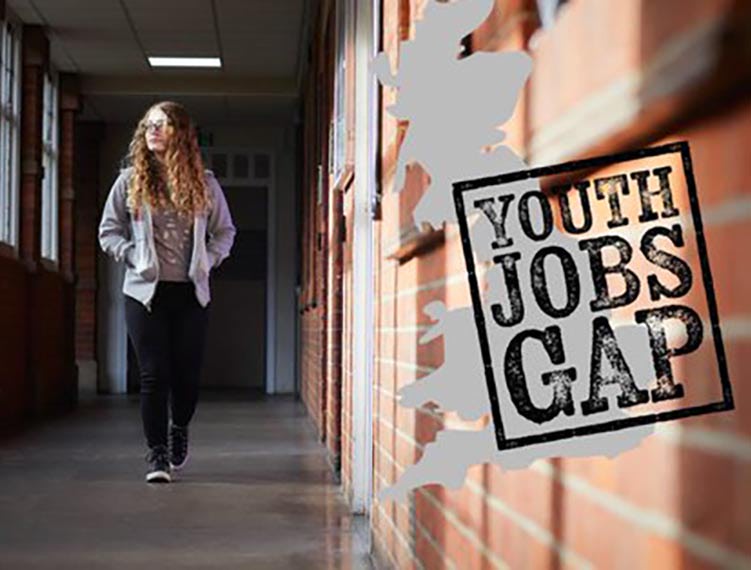Urgent help needed for London’s jobless young people: Five key recommendations

New report reveals that there is a ‘Youth Jobs Gap’ between rich and poor children in London, leaving poorer young people locked out of the labour market
Young people from a disadvantaged background in London are not getting the support they need to succeed in the capital’s thriving jobs market, according to a ground-breaking report, ‘The Employment Gap in London’, from London Councils and Impetus.
Despite the opportunities on their doorstep, young Londoners are more likely to be out of education, employment or training than the national average. This has been a consistent trend for over a decade, suggesting that a new approach to post-16 skills in the capital is long overdue.
The Employment Gap in London examines government education and employment data to provide new insights into those young people who move on from school into education, employment or training, and those who don’t (NEETs). London Councils’ and Impetus’ research shows that:
- 25% of London’s young people are low qualified, which means they’re not getting five GCSE passes or equivalent qualifications by the age of 18, which in turn places them at higher risk of unemployment.
- London has the lowest take up of apprenticeships of any region: just 4% of young Londoners started apprenticeships compared to the national average of 7%.
The Employment Gap in London reveals the extent to which young people from poorer families progress into work varies hugely in London. It provides a powerful rationale for the UK’s skills and employment system to take local issues into account to meet the diverse needs of young people in the capital.
There are successes in London – 21% of young people from London going to university are from a disadvantaged background, compared to 9% nationally. But in spite of that, in some areas young people have a better chance of getting a job if they’re from a better-off background than if they get good qualifications.
Impetus’ Benchmarking Resurgo paper, also published today, illustrates how effective and targeted support for young people from disadvantaged backgrounds changes lives.
The Resurgo Spear programme works with young people who are not in work or education to prepare them to seek, get and keep a job. Funding and support for programmes that are able to demonstrate a clear impact, as Resurgo has done, must be made available if we are to end the decade of higher than average NEET rates in the capital.
Cllr Georgia Gould, Deputy Chair of London Councils and Executive member for Skills & Employment, said:
“Our new report shows that the post-16 skills system is not doing enough to support young Londoners as they make the leap from school to further study or work.
“We must address London’s consistently high NEET rates, low participation in apprenticeships and low qualification levels or risk another generation of young people being left behind.
“This is a wake-up call for everyone involved in London’s skills system, from national Government to London boroughs, local schools and colleges. We need some radical new approaches.
“London boroughs are well placed to lead the creation of a more flexible local skills offer, but we need the powers and resources to make a real impact.”
Andy Ratcliffe, CEO at Impetus said:
“London has a lot to be proud of. Young people from disadvantaged backgrounds do well in education and have the highest university entrance rate in the country, higher than their better-off peers in other regions. But we need to do more for those young people who fall between the cracks.
“I’m so proud of the work we’ve been doing with Resurgo – not only to deliver a fantastic programme to get young Londoners on a path to work or training – but also to put their programme under the microscope to see whether they truly are having an impact. Our research shows too few young Londoners are moving out of unemployment into a job, our work with Resurgo shows a better future is possible.”
Jo Rice, CEO of Resurgo, said:
“We’re grateful to our partners at Impetus, with whom we have been able to measure the Spear Programme outcomes against the first robust longitudinal benchmark of its kind. We are delighted that the results are conclusive in demonstrating that we are positively impacting the employment outcomes of the young people we serve in tangible ways.
“At Resurgo we consistently see that young people from all backgrounds have huge potential, and despite facing significant challenges, have much to offer the workplace. We’re proud that we can conclusively say our intervention works to change their lives for the better.”
Henry Colthurst, Chairman of the City of London Corporation’s Education Board, said:
“It is not surprising to read that children from disadvantaged backgrounds are failing to secure jobs in London.
“That is why we have increased our educational involvement over recent years and sponsor academies in some of London’s most deprived areas.
“We are proud that for two years running the Sutton Trust named us as the leading academy sponsor for the attainment of pupils from disadvantaged backgrounds.
“We promote skills training, helping pupils find the work opportunities that fit their talents.
“And this year, Guildhall hosts the second London Careers Festival. It will connect over 120 global businesses with 6,000 students across London, introducing them to career options, apprenticeships and work experience opportunities, fuelling their imaginations and shaping their futures.”
In order to improve London’s skills system, London Councils is making five key recommendations:
- Invest in and devolve 16 to 18 skills provision so that London government (London boroughs and the Mayor) can ensure that there is sufficient provision to meet diverse needs and aspirations of young people across different parts of London.
- Invest in and devolve careers services, so London government can transform the currently fragmented system into a comprehensive and locally responsive service.
- Increase the flexibility of the Apprenticeship Levy to allow some funding to be used for pre-employment training and in the longer term, devolve apprenticeship funding starting with capital’s non-levy allocation so London government can work with businesses to meet local skills needs.
- Support the alignment of national Jobcentre Plus and local employment services to allow them to co-ordinate local employment support and achieve better outcomes for young Londoners with the most complex needs.
- Devolve the UK Shared Prosperity Fund (UKSPF – replacing European Structural and Investment Funds) to deliver specialist programmes for young people facing complex barriers to employment.
The report uses new LEO (Longitudinal Education Outcomes) data from the Department of Education to explore the impact of growing up in London on life chances, by connecting people’s school records with their journey into employment. It analyses data to present findings at local authority area level.
The report was launched on 25 February 2020 at an event with; Cllr Georgia Gould, Leader of Camden Council and Deputy Chair of London Councils and Executive member for Skills & Employment; Tracey Harrison, Partner and Chief Innovation Officer, EY; Jo Rice, CEO, Resurgo; and, Andy Ratcliffe, CEO, Impetus.











Responses